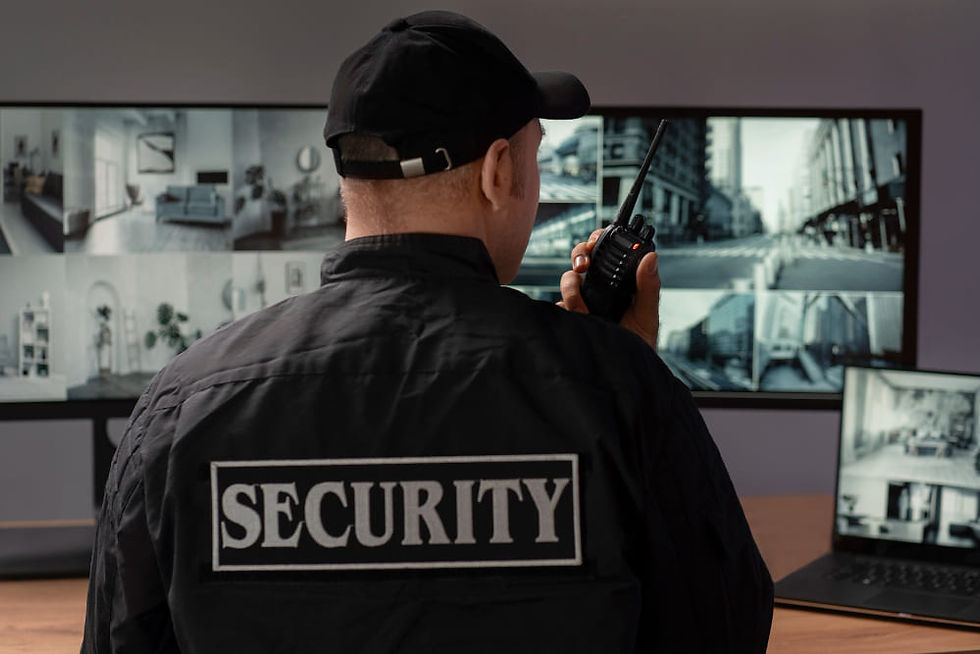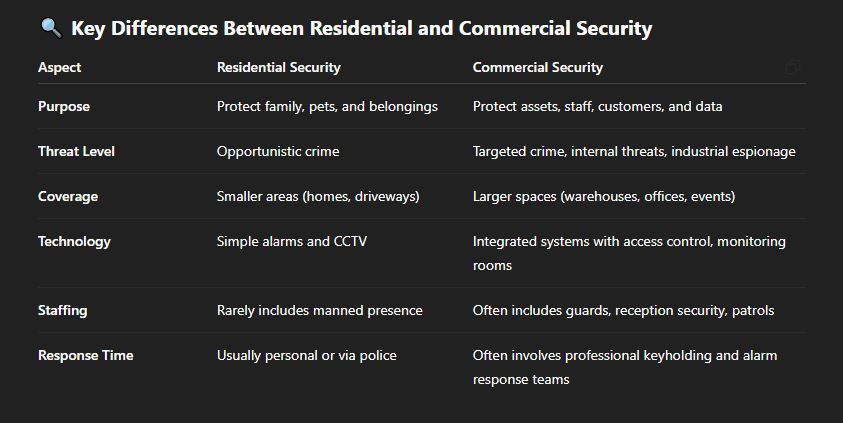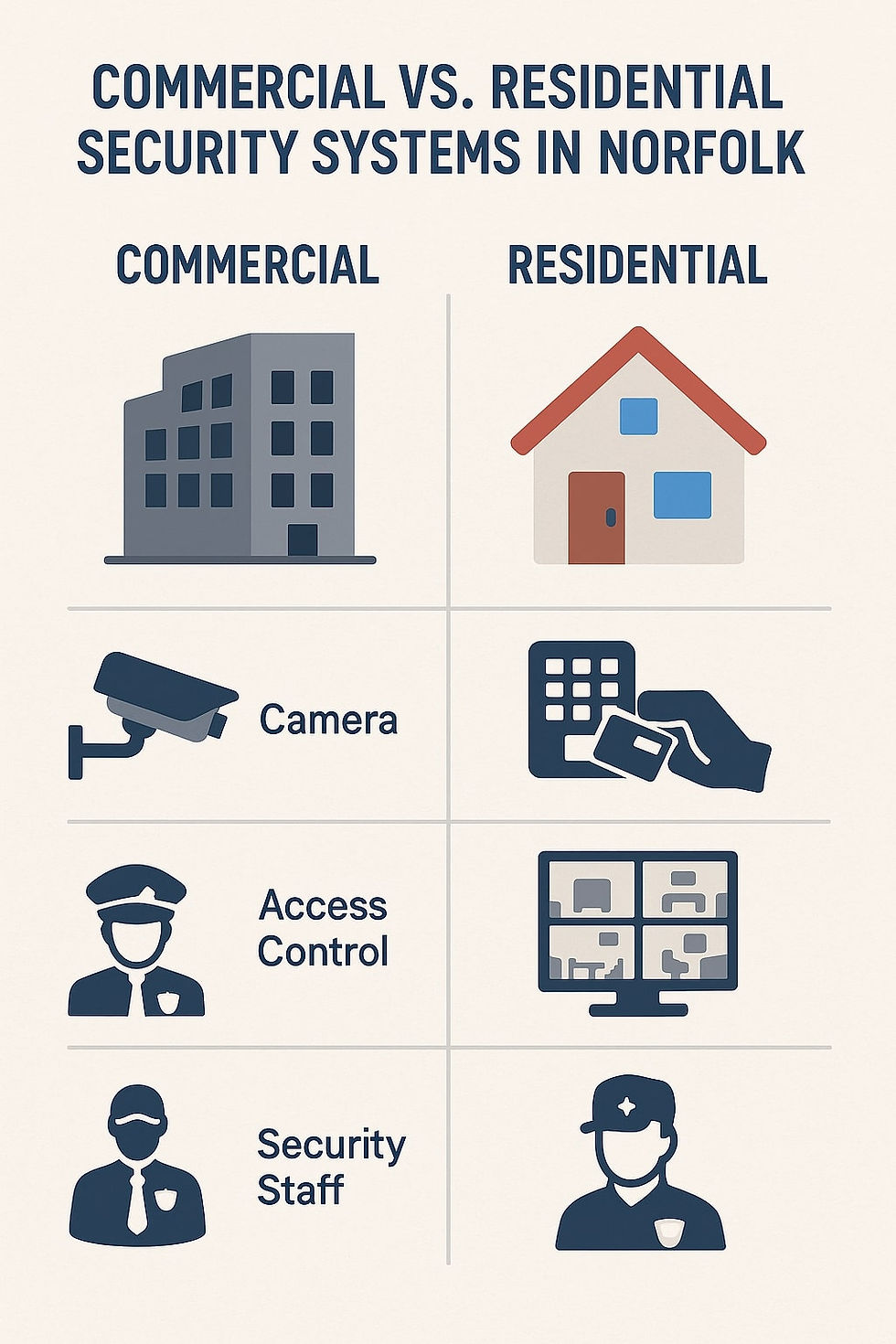Commercial vs. Residential Security in Norfolk: What’s the Difference?
- Team Roni
- May 20
- 4 min read

Security is a top priority for both homeowners and business owners across Norfolk. Whether you're protecting your family or safeguarding valuable business assets, choosing the right type of security services is essential. But how do residential and commercial security differ? While the goals are similar—deterring crime and ensuring safety—the solutions can vary significantly.
In this guide, we’ll break down the key differences between commercial and residential security services in Norfolk, helping you understand which type suits your needs best.
What is Residential Security?
Residential security focuses on protecting homes, families, and personal property. In Norfolk’s towns and villages—from Norwich to King's Lynn—residents face risks such as burglary, vandalism, and antisocial behaviour.
Common residential security services include:
CCTV installation and monitoring
Intruder alarms
Motion sensors and smart lighting
Video doorbells and access control
Mobile patrols in private estates
Keyholding and alarm response
These services are tailored to deter opportunistic criminals and offer homeowners peace of mind, whether they’re at home or away.
What is Commercial Security?
Commercial security is more complex and designed to protect businesses, employees, data, and physical assets. Businesses in Norfolk—ranging from retail shops in Great Yarmouth to warehouses on the outskirts of Thetford—often require a broader and more robust security strategy.
Typical commercial security services include:
Manned guarding and on-site personnel
Access control systems for staff and visitors
24/7 CCTV surveillance with remote monitoring
Alarm systems connected to emergency responders
Mobile patrols for business parks and industrial estates
Keyholding and out-of-hours response
Construction site security
Event security
Business premises often face more sophisticated threats, including planned theft, data breaches, or vandalism that disrupts operations.
Key Differences Between Residential and Commercial Security

While both residential and commercial security systems aim to protect people and property, their design, complexity, and operational requirements differ significantly due to the unique needs of homes versus businesses.

Purpose and Threat Profile
Residential security systems primarily protect against theft, intrusion, and vandalism, focusing on the safety of families and personal property
Commercial security systems must address a broader range of threats, including physical theft, unauthorised access, and, increasingly, cybersecurity risks. Businesses also need to safeguard assets, employees, sensitive data, and sometimes comply with industry regulations
System Complexity and Coverage
Residential systems are generally simpler, designed for smaller spaces with fewer entry points. They often rely on motion sensors, basic alarms, and a handful of strategically placed cameras
Commercial systems are more complex, covering larger areas with multiple access points, parking lots, and sensitive zones. They typically require extensive camera networks (often more than ten cameras), advanced access controls, and integrated alarm systems
Monitoring and Management
Home security is usually managed by the homeowner or a small group, often via mobile devices. Monitoring is typically automated or handled by third-party services that alert authorities if needed
Commercial systems may require dedicated security staff or teams to monitor live feeds and manage access, especially in large facilities. These systems often include professional 24/7 monitoring, remote access, and integration with law enforcement or emergency services for rapid response
Technology and Features
Residential systems commonly use wireless technology, motion-activated cameras, and smart home integrations (like controlling locks or thermostats remotely)
Commercial systems favour hardwired setups for reliability and to support the bandwidth needs of numerous cameras. They may include features like continuous video recording, advanced analytics, and customised access levels for employees
Cost and Scalability
Residential security systems are generally less expensive, reflecting their lower complexity and scale
Commercial systems involve higher upfront and ongoing costs due to their larger scale, advanced features, and maintenance needs
Legal and Regulatory Considerations
Commercial properties are subject to stricter regulations regarding surveillance, privacy, and data storage, especially in areas like employee monitoring and customer privacy
Residential systems face fewer legal restrictions, but must still respect privacy boundaries, such as not recording in private areas without consent
Presence of Security Personnel
Residential buildings may have security staff, but often rely on visible deterrents and community programs like neighbourhood watch
Commercial properties might employ on-site security teams, especially in high-risk industries or large facilities, supplementing electronic systems with physical patrols and rapid incident response
Why Local Knowledge Matters in Norfolk
Choosing a provider that understands the unique needs of Norfolk communities can make a real difference. For example, security services in rural areas may prioritise rapid response times and remote CCTV monitoring, while businesses in urban centres may focus more on crowd control, access management, or theft prevention.
A local security provider will be familiar with high-risk zones, typical crime trends, and regional compliance requirements.
Which Security Service Do You Need?
Ask yourself the following questions to decide which service suits your needs:
Are you protecting a home or business premises?
Do you require a visible security presence (e.g. guards or patrols)?
Is your property vacant at times (e.g. second home or warehouse)?
Do you need 24/7 surveillance and professional response?
In some cases, you may benefit from a hybrid solution. For instance, landlords and property developers in Norfolk often use both residential and commercial security services to protect developments, show homes, or vacant properties.
Investing in the Right Security Solution
Ultimately, whether you’re a homeowner in Wymondham or a business owner in Dereham, investing in the right security services means assessing your risks and tailoring protection accordingly. An experienced, local provider will offer a detailed security assessment and recommend the best solution based on your property, budget, and level of risk.
Looking for Professional Security Services in Norfolk?
No matter your needs—commercial or residential—partnering with a trusted security company ensures your property is always protected. From CCTV and alarm systems to mobile patrols and manned guarding, tailored solutions offer the best defence against threats in today’s world.
For peace of mind and reliable protection, get in touch with a Norfolk-based security provider and take the first step towards safeguarding what matters most.
Comments